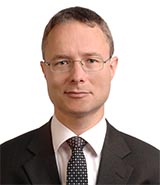
Dirk F. Niepelt, CES guest in November
Buying and Selling Credibility
The European debt crisis drags on and its implications for financial markets continue to dominate policy discussions in Europe. Dirk F. Niepelt, CES visitor from 16 to 20 November, has analysed creditor-debtor relations in the sovereign debt context. In joint work with Harris Dellas (CESifo Working Paper 4335), Mr Niepelt has focused on the composition of a country's creditors. As he points out, the incentives for a heavily indebted country like Greece to declare default vary a great deal depending on whether the national debt is primarily held by official creditors like the European Central Bank, or by private investors and banks. Since official creditors and the indebted country interact on a repeated basis, along many dimensions, the former are in a better position to punish the latter. As a consequence, official creditors can "sell credibility" to an indebted country when purchasing its debt, and the latter can benefit from "buying credibility". Official sector intervention during a debt crisis therefore does not come as a surprise but it has rich and partly counterintuitive repercussions on a country's prior default and rollover choices.
Dirk Niepelt, also jointly with Harris Dellas, has demystified the "austerity" buzzword that haunts policy discussions in Europe. He defines austerity as a sacrifice of current consumption in excess of what a country's debt capacity (due to limited ability or willingness to service debt) might be thought to require. When information about the borrower's type is incomplete, however, such consumption sacrifices and other forms of signalling make perfect sense. In particular, as Mr Niepelt points out, austerity may serve as a tool for securing a more favourable loan package; that low risk borrowers may favour more to less severe austerity; and that austerity may actually be associated with higher subsequent growth.
Dirk Niepelt is Director of the Study Center Gerzensee, a Foundation of the Swiss National Bank, and Professor of Economics at the University of Bern. He is Research Fellow at the Centre for Economic Policy Research (CEPR), CESifo Research Network Fellow and member of the macroeconomic committee of the Verein für Socialpolitik. He served on the board of the Swiss Society of Economics and Statistics and was a visiting professor at the Institute for International Economic Studies (IIES) at Stockholm University. Dirk Niepelt received his PhD in economics from the Massachusetts Institute of Technology (MIT) and holds a licentiate and doctorate from the University of St. Gallen. Prior to joining the Study Center Gerzensee, he was assistant professor at IIES. Before completing his PhD, he worked at applied research institutes in St. Gallen and Zurich (FEW, KOF). His research interests include macroeconomics, international finance, political economics and public finance.
